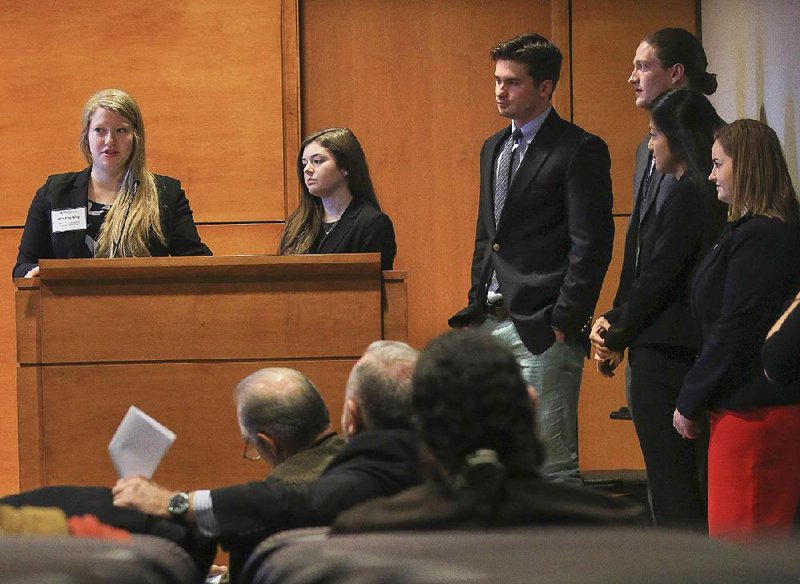Global leaders of governments, nonprofits, businesses and financial institutions gathered in Little Rock this week to discuss how to finance development projects in the United States and across the world with a focus on environmental sustainability and poverty.
The Global Solutions Summit met downtown Sunday through Thursday, four years after the previous meeting of many of the same groups in Little Rock.
International groups Club de Madrid and P80 Group Foundation met in Little Rock four years ago to sign the "Little Rock Accord," which created a task force designed to harness public- and private-sector financing to promote environmentally sustainable growth.
Club de Madrid is a coalition of more than 100 former presidents and prime ministers of democratic nations. P80 Group Foundation is a collection of public pension and sovereign wealth funds founded by Britain's Prince Charles, the prince of Wales, to address climate change. The first Global Solutions Summit to address many of the ideas of the Little Rock Accord was held in 2014 in Washington, D.C.
Changing political landscapes on environmental policy and burgeoning antipathy toward globalism aren't concerns of the groups, said Al Watkins, chairman of the Global Solutions Summit, director of the P80 Group Foundation and senior adviser to the Global Technology Deployment Initiative.
U.S. President-elect Donald Trump has expressed skepticism about climate change and recently selected an opponent of U.S. Environmental Protection Agency policies to lead the agency during his administration.
But Watkins, who previously worked at World Bank for 24 years, said the summit isn't about politics and hasn't focused much on using governments to carry out more environmentally sustainable practices.
Watkins said part of that is deliberate. The private sector has the money for the projects, so the discussion is more on how to use that money on those projects and new technologies on a large enough, but manageable, scale so that investment firms would want to be involved.
The challenge is one of balance, Watkins said. For instance, he said, small projects in several places would be more sustainable and tailored to those places, but the trick is figuring out how to finance them and manage them.
"It's easier to do a $1 billion power plant than it is to do 1,000 $1 million plants," he said, adding that smaller, local projects make better sense than trying to connect small communities far apart.
Presenters spoke about sustainable development projects from Arkansas to India and the economic advantages of investing in them as a means to combat climate change.
Projects included L'Oreal's recent investment in solar panels at its North Little Rock facility, and electricity and clean water efforts abroad. Heifer International Senior Vice President for Investment Programs Dave Norman discussed his group's construction of dairy hubs in east Africa for farmers, and Jamie Bechtel, co-founder and CEO of A New Course, discussed her group's work to disseminate lights to replace harmful kerosene lamps.
The Global Solutions Summit was held in Little Rock in 2012 because of the local leadership at the time, said Mark Grobmeyer, managing director of P80 Group Foundation. That included Heifer International, Winrock International and the Clinton School of Public Service. The meeting this year was intended to build on the 2012 Little Rock Accord.
"I'm sure we'll have another one of these four years from now," Grobmeyer said.
Since the 2012 Little Rock Accord, the task force -- which consists of nonprofits, schools and think tanks and is staffed by volunteers, experts and Clinton School of Public Service students -- has held weekly conference calls, showcased work being done around the globe, and identified and reached out to additional partners, including companies.
The Global Solutions Summit opened Sunday with optional church services, lunch and sightseeing.
Gov. Asa Hutchinson opened the conference's panels and presentations Monday with a speech about technology's role in solving global problems and touted his computer-science initiative in state schools. Technology can enhance security, Hutchinson said, referring to his time working for the U.S. Department of Homeland Security, and it can address shortages in food, water and energy.
Former Fulbright scholars also spoke Monday about their experiences and mobilizing the more than 300,000 Fulbright alumni to promote using technology to address growth and sustainability across the world.
Among the alumni was former Bosnia-Herzegovina Prime Minister Zlatko Lagumdzija, who studied computer science in the U.S. more than two decades ago. During his time in the U.S. he said he discovered that computers were just "empty boxes" and that they have no purpose unless people give them one. While computers give power to people who may do good as well as to people who may do bad, Lagumdzija said he sees Club de Madrid as a tool for creating harmony and protecting democracy.
While more people live under democracies now than 30 years ago, Lagumdzija said problems have proliferated, driving a decline in democracy. He said people should fight for "more democracy, more freedom, more shared society ... to show them that our world is better than their world."
Monday's attendees also heard a presentation from a doctor on the long-term savings versus short-term costs of investing in lower-emissions technologies and energies.
Panels Tuesday and Wednesday focused on such topics as investment projects, technologies and business models.
Cleaner technologies, like those used in "green" buildings, are cost-efficient to operate because of lower energy costs, Watkins said.
"I think climate change is important," he said, "but you don't need climate change" to convince an investor.
Metro on 12/16/2016
